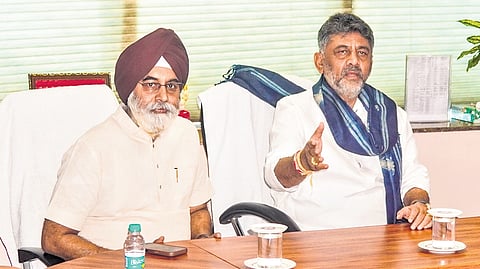

BENGALURU: The visit of Deputy Chief Minister DK Shivakumar and a team of BBMP officials to Tehkhand Waste-to-Electricity Plant in New Delhi on Monday morning has sparked a renewed debate over the state’s solid waste management strategy.
Shivakumar described the facility “the most modern” he has seen and praised its ability to process 2,000 tonnes of municipal solid waste (MSW) daily and generate 25 MW of electricity.
“It was an insightful visit and a good learning experience for me. Let me go to Bengaluru and discuss this with my colleagues,” he said. Dy CM has had visted similar plants in other places.
The Tehkhand plant, operated by Tehkhand Waste to Electricity Project Limited, a joint venture between Jindal Urban Infrastructure and the Municipal Corporation of Delhi, began operations in 2017 with an infrastructure to produce 25 MW of power from about 2,000 tonne of solid waste.
They have plans to expand the capacity to handle 3,000 tonnes of waste and generate 40 MW.
Built at a cost of Rs 375 crore, the project aims to reduce Delhi’s landfill strain. Environmentalists were concerned when this waste-to-energy plant was levied a fine of about Rs 5 lakh four years ago for exceeding emission limits.
Vinay Sreenivasa, an advocate and activist, criticized the reliance on waste-to-energy (WtE) plants, calling them polluting and unsustainable. “They do nothing to solve the long-term problem of waste management,” he said. “We are only seeing bigger landfills and WtE plants under this government, with no serious effort to reduce waste at the source or improve recycling.”
Sreenivasa pointed to luxury consumption and online shopping as contributors to the waste crisis that remain unaddressed.
In contrast, environmental scientist Prof. J Robert, a professor of ecology at IISER, argued that technological solutions like WtE plants are essential to manage waste in densely populated cities.
“A purely land-based approach won’t work,” he said. “At least some operational costs can be offset by generating energy.” He also noted that citizens must bear a share of waste management costs, which can incentivize scientific and better waste practices.
“We have to be transparent about environmental impacts, like emission, residue that emanate from these plants. It goes without saying that the impacts will have to be suitably addressed.”